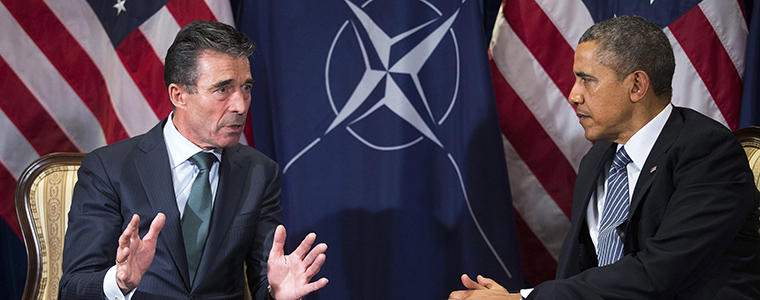When Sanctions Aren't Enough
If NATO wants to stanch Russian adventurism in Eastern Europe, it needs a comprehensive security plan (and fast).
It should be clear now that the West has a Russian security problem. Twice in the last six years, the Kremlin has seized territory in a neighboring country on the grounds of protecting minorities or ethnic Russians and Russian speakers. In each instance, the rejoinder from the West proved to be inadequate. Now, this threat demands a broad response that goes beyond the steps taken to date, that will deter the Kremlin from further aggression.

In 2008, the victim was Georgia. The Russian army took control of South Ossetia and Abkhazia and recognized their declarations of independence. This past winter the victim was Ukraine. Russian troops seized Crimea and proctored a dubious referendum in which 97 percent of the voters allegedly chose annexation by Russia. Less than one week after the vote, the Russian government formally "annexed" Crimea.
Russian President Vladimir Putin has since declared that he has no further territorial designs on Ukraine. In his March 18 speech in the Duma, however, he noted that the Bolsheviks in 1918 gave to Ukraine the "historical South of Russia" (a swath of land from Kharkiv, Luhansk, and Donetsk in Ukraine's northeast stretching southwest to Odessa) with "no consideration for the ethnic makeup of the population." He reiterated his intention to protect Russians abroad and expressed concern about the "ongoing disorder" in Ukraine. Yet it is the Kremlin that continues to send in clandestine agents to stir up unrest and continues to marshal large military forces near Ukraine's eastern border.
Putin has shown a willingness to violate sovereign borders, Russian obligations, and international law. Having declared himself the protector of ethnic Russians and Russian speakers outside of Russia, he has used this principle to pressure neighboring governments and to change territorial borders by force.
The question now is how the United States and NATO should respond. President Barack Obama has designed financial sanctions to chasten the Kremlin for its aggression against Ukraine, and the European Union has followed suit. But Obama now needs to lead NATO in developing a security response -- the West needs to take seriously the possibility of future Russian aggression.
There are many countries at risk from Kremlin trouble making "on behalf" of ethnic Russians. Of most immediate concern to NATO are its Baltic members. Ethnic Russians make up 28 percent of the population in Latvia and 25 percent in Estonia (and 6 percent in Lithuania). NATO should consider measured steps to increase its defensive capabilities in the Baltic states, for example by providing anti-aircraft missiles and anti-armor systems. Putin's aggressive concern for ethnic Russians is also a danger to the states of Central Asia. Ethnic Russians number 23 percent of Kazakhstan's population, concentrated in the north along the border with Russia.
The U.S. decision to increase the contingent of F-15s in Lithuania and dispatch F-16s to Poland were smart steps to assure nervous Central European allies, but more is necessary. NATO should continue to commit at least 10 fighters -- the number of U.S. F-15s now in Lithuania, up from the usual four NATO fighters -- to the Baltic air-policing mission for the foreseeable future.
At the same time, NATO should review its policy on its eastern flank. In 1997, it affirmed that "in the current and foreseeable security environment, the Alliance will carry out its collective defense and other missions by ensuring the necessary interoperability, integration, and capability for reinforcement rather than by additional permanent stationing of substantial combat forces." Putin's actions have dramatically altered the European security environment; the Alliance should consider whether it should change its policy in response.
NATO attention should not exclude its southeastern flank. Cynical Kremlin exploitation of ethnic Russian minorities makes Transnistria in Moldova, Romania's neighbor, a potential flashpoint.
The point of this review and the deployments to NATO's Baltic and Central European members is to deter further Russian aggression and to signal to the Russian General Staff that the seizure of Crimea has complicated their strategic position.
In parallel with the above steps, NATO should freeze all arms sales to Russia. The German government announced last week that it would not proceed with the sale of an advanced combat simulator to the Russian army. The French should cancel, or at a minimum suspend, sale of Mistral-class helicopter assault ships to the Russian navy.
There is no expectation that American or NATO forces should defend Ukraine from further Russian invasion. But there is every reason to help Ukraine to defend itself. First, the West should help Ukraine guard itself from Russian subversion. It should provide border control equipment and training to help Kiev keep Russian agitators and provocateurs from entering the country. Second, the West should also share intelligence with Ukraine about Russian efforts to destabilize the country and Russian military plans threatening Ukraine. Third, NATO should conduct regularly scheduled joint exercises in Ukraine. Finally, should the Russian military continue its threatening stance, NATO should provide anti-tank and anti-aircraft weapons, and appropriate training, that would raise the costs of any further aggression against Ukraine.
The Kremlin's aggressive new posture could threaten other states on its border, including Georgia and energy-rich Azerbaijan. Kazakhstan -- where 23 percent of the population, or higher along the northern border with Russia, is ethnic Russian -- also might be vulnerable. Uzbekistan in the past has had concerns about Russian ambitions in the Central Asian region. Key NATO members should consult with the governments of these countries on the implications of Moscow's apparent new policy.
These steps would bolster NATO security, strengthen Ukraine's ability to resist aggression, and offer political support to other countries made nervous by Putin's recent actions. More pointedly, such a show of strength could discourage the Russian leader from more Crimeas.
Reposted with permission from ForeignPolicy.com, Source: “When Sanctions Aren’t Enough"



